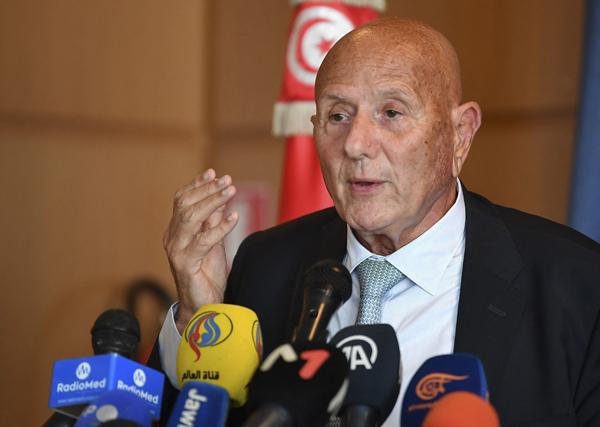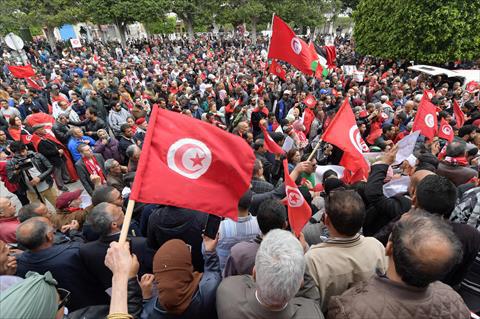You are here
Tunisian opposition announces alliance against president
By AFP - Apr 26,2022 - Last updated at Apr 26,2022

Tunisian politician Ahmed Najib Chebbi speaks during a press conference in the capital Tunis to announce the launch of the establishment of the ‘National Salvation Front’, on Tuesday (AFP photo)
TUNIS — A veteran Tunisian opposition figure announced on Tuesday the creation of a new alliance to "save" the country from deep crisis following President Kais Saied's power grab last year.
Ahmed Nejib Chebbi, 78, a prominent left-wing politician who opposed dictator Zine Al Abidine Ben Ali's rule, said the new National Salvation Front aimed to unite political forces, reestablish constitutional and democratic processes and guarantee freedoms and rights in the country.
"We want a return to legitimacy and democracy," he told a news conference in the capital Tunisia.
Saied — a former law professor elected in 2019 amid public anger against the political class — on July 25 last year sacked the government, suspended parliament and seized wide-ranging powers.
He later gave himself powers to rule and legislate by decree and seized control over the judiciary.
He dissolved parliament last month, dealing another blow to the political system put in place after the North African country's 2011 revolution.
Chebbi opposes Saied's moves and describes them as a "coup".
The new alliance comprises five political parties including Saied's nemesis the Islamist-inspired Ennahdha Party, along with five civil society groups involving independent political figures.
The Front's priority is to rescue an economy ruined by a "rotten" political system that puts off investors, Chebbi said.
It also aims to involve other political groups and "influential" figures before launching a national dialogue on reforms to "save the country", he added.
Chebbi called for a "salvation government" to lead the country during a "transition period" before new elections.
Last week Saied assigned himself the power to appoint the head of the electoral commission, a move critics say aims to create a tame electoral body ahead of a referendum slated for July on constitutional reforms, and legislative elections due in December.
Last month, Saied also inaugurated a "temporary" council of judges to replace an independent watchdog he abolished when seizing sweeping powers over the judiciary.
Saied's initial power grab last year was welcomed by many Tunisians sick of the often-stalemated post-revolution political system.
But an increasing array of critics say he has moved the country down a dangerous path back towards autocracy.
Saied has argued that the North African country's 2014 constitution allowed him to take "exceptional measures".
The country is also in talks with the International Monetary Fund aimed at securing a financial bailout.
Related Articles
TUNIS — A crowd estimated at more than 2,000, lower than expected, took part Sunday in the first demonstration of a new alliance to oppose a
TUNIS — Hundreds of Tunisians demonstrated Sunday in a show of support for President Kais Saied and a series of extraordinary measures he to
TUNIS — Tunisia's main opposition coalition pressed the government on Monday to explain a days-long public "absence" of President Kais Saied


















